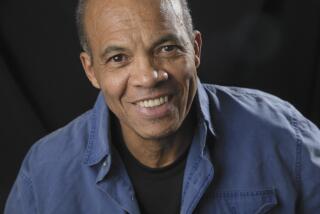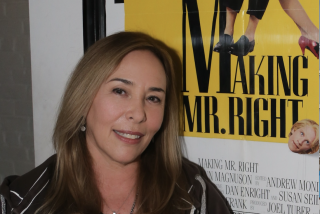The new weird order
David Sedaris isn’t trying to change the world. He’s just fond of tweaking the universe now and again -- just because he can.
So last week, the author was up to his familiar bent mischief. At the close of his reading to promote his latest book, the bestselling “Dress Your Family in Corduroy and Denim,” he informed the sold-out crowd of 1,800 at UCLA’s Royce Hall that he would offer priority signing -- for smokers.
A pack of cigarettes would usher the bearer to the front of the line, which, if it was anything like it’s been around the country, could be at least a four- to --five-hour wait. “You nonsmokers are going to live longer than us anyway,” he explained.
A wave of dubious chuckles rose from the crowd. The laughter gathered steam as Sedaris, installed behind an imposing podium, continued to lay down the rules: “And for those of you smokers who will think about giving your packs to the nonsmokers, I think you should ask yourself: ‘Would he let me smoke in his home?’ The answer is no.”
Several hours worth of a line snaked from Royce’s west lobby out onto the brick courtyard. Smokers, proudly brandishing their American Spirits and Marlboro Lights, pressed to the front of the queue. Bewildered ushers stood at the doorways, double-checking with publicity staff to make sure they had grasped the rule as a rule. Not a joke.
With Sedaris you can’t always be certain.
Later, Sedaris says, “One guy really got upset! He said it was state property. ‘How could they do that?!’ he mimics, stepping down his twangy wisp of a voice half an octave. “The UCLA people told him that it was my decision. He was still pretty hot. “I thought, well, if I had given priority signing to SUV drivers, I don’t think he would have found any problem with that. He would have happily taken his place. First in line.”
Sedaris knows what it’s like to be on the other side of the velvet rope. His outsider-ness has heightened his awareness.
He’s been the marginalized Everyguy, his worries, tics, obsessions and neurosis raging all over the page. He’s survived the nightmare neighbors, the carousel of weird, dead-end jobs, the father who kicked him out because he’s gay, the random, unhinged stranger. But unlike the rest of us, he has the withering riposte at the ready. “He’s so smart, so amazingly twisted,” said Daavid Hawkins, who was milling among the Sedaris-ites hoping for a glimpse. “That makes him a kindred spirit.”
An antihero with 3 homes
It was the dizzily off-kilter piece “SantaLand Diaries” that introduced Sedaris to the world. Broadcast on National Public Radio during the 1992 holiday season, the dry, wickedly mordant essay recounted his hyper-surreal experiences as a Macy’s elf. With his clipped, prim voice, his slightly haughty delivery and his ability to journey to the center of the absurd and stare it down, Sedaris became an NPR regular -- and later a cult icon. Another collection, “Naked,” followed in 1997, but it would be 2000’s “Me Talk Pretty One Day” that cemented his reputation. The collection made him not just a book celebrity but a genuine literary star.
“Dress Your Family,” his latest collection, is already No. 1 on the New York Times bestseller list. Thousands crowd in for readings nationwide; fans nod along with favorite passages as if hearing famous guitar riffs. All of it has made him the rarest of writers, one who can appear on David Letterman to try out a piece or sell out Carnegie Hall but not lose his hip cachet.
All things considered, his offstage life appears to have taken a posh turn as well. An apartment in Paris, a flat in London, a house in Normandy, all of which he shares with his boyfriend, artist Hugh Hamrick.
Consequently, though much of the press has been largely favorable, there has been an underlying theme murmuring through much of it: “Will success spoil our antihero, Mr. Sedaris?”
“I think people think I believe my press kit,” says Sedaris, settling down for a quick lunch sandwiched between print and radio interviews. “I don’t even read my press kit. I don’t even read my press.” He places a large corduroy tote on the chair next to him, lets out a quick sigh. Dressed in sand-colored slacks, a brown-and-white checkered shirt, with a red notebook and silver pen peeking out of his breast pocket, he looks as informal as the tossed-off voice that shepherds us through his stories.
Appearances, he knows, are deceiving. “When I leave here when all this is over, I’m going to go back to the little village I live in [in Normandy]. There are 12 houses there. This will be very far away.”
At 47, it’s not lost on him, however, the difference a decade has made. His professional life has been all-consuming. Do people approach him doing or saying outrageous things in hopes of finding themselves sunk into a story? Is he often asked to do a line from “that elf story”?
Not so much, really. “People try to tell me outrageous stories. Like when I read the story about [something] I found in the toilet. People often come up to tell me about [what they found in their toilets]. Hand gestures and everything. This was a story of discovery,” he says, straight-faced. “People don’t get the difference.”
He takes a quick glance at the menu, homing in on the salad selections. “I like the word ‘cobb.’ But blue cheese tastes like Comet.” He settles on a carne asada salad, “because that’s something I can’t get on the room service menu.”
For him life feels just about the same; the backdrops are just different: He writes. He sneaks away to the movies with friends. He and Hugh entertain. “In London I have a little job working in a drop-in center for old people. My goal is to become a slave for old and sick people. I don’t have a big heart. This isn’t about a higher purpose,” he deadpans. “I want to see the inside of people’s houses. This is about me.”
Of late he’s been working on pieces that involve his life in England. “But my accent isn’t very good. So I can’t really do those live,” he says with a sigh.
Humbled by humanity
Sedaris writes for the ear rather than the page. Honing the pieces before audiences -- writing and rewriting around reaction. He seldom feels finished with anything. He keeps mining for the best, most honest word. “I don’t go to sleep until I find it. ‘Just what does a teenage boy’s watch look like?’ ”
That obsessiveness haunted the completion of this book, which has an overlay of melancholy and self-reflection laced through the usual absurdity. “I wasn’t sure if it was done. I’m my worst critic. I don’t trust my judgment. I don’t trust audiences all the time. But I trust the New Yorker, where some of these stories appeared,” he says, turning it all over still. “I figured, ‘I’ll just trust them.’ So that made me feel better. Sort of.... “
His other gauge has been the steady stream of fans who drift by the signing table. “Back when I started reading at this club in Chicago, it never occurred to me that I would have an audience so -- and I hate this word -- diverse. I thought everyone would be gay and exactly my age. Later I thought they’d just be public-radio-listening Democrats, that they would be like me.”
That turned out not to be the case. “One night I look up and I see these two dwarfs. And my thought is: ‘Did I say something offensive about dwarfs and now they are here to talk to me about it?’ Then I saw this Russian guy. Then a Chinese psychotherapist. And a 14-year-old girl. This is just a small segment of the line. And it really surprises me.”
And humbles him as well. “I’m most honored when teenagers come especially. Because they could be doing so many other things and they’ve made the time to come hear a middle-aged guy talk about the lump on his [derriere].” He dips into the big corduroy bag and begins pulling out boxes and bags. Shampoo. Chocolates. Handkerchiefs. “And here’s a sticker of this ugly old guy I got in Bangkok. I’m going to hand all these out tonight. To thank them.”
With all the success, the insecurities continue to roil. “When there is a crowd of 3,000 and it’s sold out and suddenly one person gets up and heads to the back of the auditorium, it’s devastating. I don’t think about the other 2,999 people sitting there. I think about the one person who left. And why? His judgment means something. That just never goes away.”
It’s that very seam -- anxiety, marginalization and alienation -- that so vividly stitches up his work. “I thought the last book was it. Then I thought I would begin my slow descent into obscurity and alcoholism. “I’m very aware that careers don’t go on forever. So I’m happy ... to bask in it. Be accessible.”
Those fans see their failures, their isolation, even their passing bliss, in Sedaris’ stories. “You look at his life,” said Stephanie Thatcher who drove from San Diego for the show and said she would gladly wait the two more for her chat and signature. “You look at all that’s happened. Where he’s been and where he is, and think, it can happen to you.”
More to Read
Sign up for our Book Club newsletter
Get the latest news, events and more from the Los Angeles Times Book Club, and help us get L.A. reading and talking.
You may occasionally receive promotional content from the Los Angeles Times.









